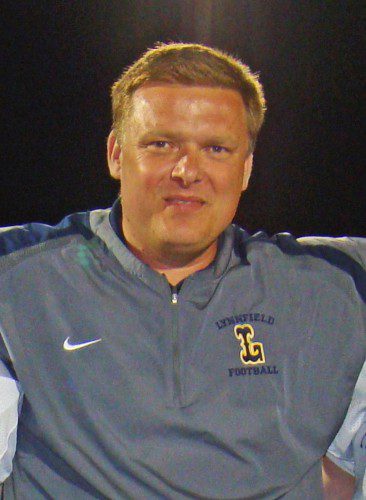Published in the March 23, 2016 edition
By TOM CONDARDO
LYNNFIELD — In the three years of the current playoff system, the Lynnfield Pioneers have battled teams from Watertown, Swampscott, Saugus, Bedford, and Holliston. Thanks to the addition of two new divisions and a switch from 16 to 12 teams in each, the Pioneers can say goodbye to those bigger schools and will be matched up with teams more their size if they make the post season tournament in 2016.
The MIAA has gone from six divisions to eight with schools placed according to male enrollment in grades 9-12. The Pioneers (male enrollment: 320, up from 305 in 2013), have been placed in Division 3A, the sixth largest division in the North, a drop of two divisions from last year’s D4 assignment. They go from being the second smallest school in last year’s 16-team D4 to the second largest school in this season’s new D3A.
Fellow CAL league members Hamilton-Wenham and Ipswich will join the Pioneers. Five of the 12 schools in the division actually have higher enrollments than Lynnfield, but for placement purposes, vocational schools were cut by two-thirds.
If the Pioneers make the playoffs, they will be competing against Matignon (411 combined with St. Joseph Prep), Stoneham (304), Hamilton-Wenham (279), Winthrop (274), Ipswich (266), St. Mary’s (235 after a plus 1.3 multiplier as a private school), Shawsheen Tech (231 after an 0.3 multiplier), Whittier Vocational (218 after the multiplier), Greater Lawrence Tech (215 after the multiplier), Northeast Metro Tech (200 after the multiplier) and Boston Latin (765). By agreement, all Boston Public Schools were placed in lower divisions, which is the reason Boston Latin was placed in this smaller division. Eight of the 12 teams will qualify for the playoffs instead of eight out of 16, which was the case last season.
Despite now being one of the larger schools in their division, Lynnfield’s head coach Neal Weidman still thinks the Pioneers are in for some tough battles if they make the playoffs.
“If you look at some of the teams that we’re with, the competition is going to be similar,” he said. “You have Stoneham, St. Mary’s, and Winthrop and some other tough matchups. Obviously any time you play in the playoffs you’re still going to have dogfights against teams. Technically this is where we’re supposed to be based on the size of the school. There was a chance we were going to be bumped up, and if that had happened we wouldn’t have appealed.”
As for the rest of the CAL, Masconomet (632 enrollment) is alone in Division 2 while North Reading (407) is the only CAL team in D2A, two divisions higher than the Pioneers. They appealed its placement but were denied by the MIAA along with all other 16 schools who appealed their placements. Newburyport (370), Triton (346), Pentucket (333) and Amesbury (331) were placed in D3. Manchester–Essex (365 when combined with Rockport) and Georgetown (188) – which have gone independent and will not be playing a CAL football schedule this season – were both placed in D4.
The placement also provides the Pioneers with an opportunity to amass more points during the regular season. Matchups against now higher division Newburyport and Amesbury will be worth 12 points instead of 10 as will their game against Danvers. The other three CAL Baker Division games will be worth 10 points each.
With Georgetown opting out, the Pioneers are scrambling to fill an open date in their schedule. They’re not having much luck yet, according to Weidman.
“It looks like we might have a bye in week six,” Weidman said. “We’re still looking so we’ll see how it goes.”
The Pioneers will be seeking their fifth straight league title this season, but they’ve graduated over 40 players in the last two years so will have plenty of holes to fill.
“We’re going to be a much younger team than we’ve been,” Weidman said.
The new alignments may only last one season because the MIAA general membership will be voting Friday, April 8 on whether to continue the current playoff system. When the plan was approved 161-131 as a pilot program in 2012, member schools were told there would be a review and another vote after two years. That vote never took place, but earlier this year the Bay State Conference athletic directors convinced the Board of Directors to put the system up for another vote.





